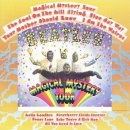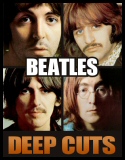Music Home / Entertainment Channel / Bullz-Eye Home
 Buy your copy from Amazon.com
Buy your copy from Amazon.com
| The Beatles: Magical Mystery Tour Released: 1967 |
Rock n’ roll music has inspired countless debates among its fans since the inception of the genre; it doesn’t involve much charity to suggest that the Fab Four have probably featured in a sizable chunk of them, and, of those, a topic which pops up as often as not involves the rhetorical question, “Which is the best Beatles album?”
Obviously, it’s a tough question to answer definitively – if you’re a fan of the band, there’s a certain amount of merit to just about every full-length release in their discography – but, of course, you’ve got a couple of usual suspects that almost always score a mention in such discussions, with Revolver and Sgt. Pepper’s Lonely Hearts Club Band generally being the two most common. For years, I remained pretty solidly in the Revolver camp, but, as time passed, I found myself wondering if my decision on the matter was based more in a subconscious desire to stick with the critical consensus, and the more I thought about it, the more I realized that, actually, Revolver wasn’t my favorite Beatles album. No, when it comes right down to it, the Beatles record that I find myself spinning far more often than not is their 1967 semi-compilation, Magical Mystery Tour.
The phrase “semi-compilation” may not be the most precise description of the album, but nor is it entirely inaccurate; it served both as the soundtrack to a Beatles TV special (one which, despite premiering in the UK in 1967, didn’t air in the U.S. until 1976) and as a catch-all for a couple of non-album singles the band had released during the year. Given this situation, to call Magical Mystery Tour your favorite Beatles album is kind of like calling Bona Drag your favorite Morrissey album; you know it’s technically not an album, but since none of its songs had ever appeared on any other album at the time of its release, you find that you can justify it pretty easily…especially when you take a look at the track listing.
No, seriously. Take a gander at what songs are on here.
I mean, with “Penny Lane,” “Strawberry Fields Forever,” “I Am the Walrus,” “Hello Goodbye,” “All You Need Is Love,” and the title cut, you’ve got a quick six-pack of some of the best songs the band ever recorded. McCartney sat down and wrote one of his most lovely piano ballads in “Fool on the Hill,” then offered up a nice little dance-hall number in “Your Mother Should Know,” while Lennon threw together the enjoyable “Baby You’re A Rich Man,” which may or may not be a less than flattering “tribute” to Brian Epstein. (Reportedly, at the very tail end of the song, if you listen closely enough, you can hear the title refrain turn into, “Baby, you’re a rich fag Jew.”) Even the lone Beatles composition to be credited to all four members, the instrumental “Flying,” is a pleasant, if insubstantial, bit of piffle. Really, the only song that bears skipping – and, in fact, the reason the album loses that precious half a star in its rating – is George Harrison’s incredibly boring “Blue Jay Way.”
Of course, given that this was 1967, it’s no surprise that you can almost taste the electric colors from all the acid dripping off a few of these songs, particularly Lennon’s “I Am the Walrus.” It’s one of the Beatles’ two definitive psychedelic statements on this album – the other being “Strawberry Fields Forever” – but despite being partially based on Lewis Carroll’s “The Walrus and the Carpenter” (and reportedly drawing inspiration from James Joyce’s “Finnegan’s Wake”), you can’t really tell what the hell John’s on about. But, then again, you couldn’t really tell what the hell John was on about most of the time, I don’t suppose, could you?
If you’re a purist, then, okay, fine, you probably won’t buy into the theory that Magical Mystery Tour is the best Beatles album of all time. But can we at least agree that, given the sheer number of near-perfect songs contained within its grooves, it was one of the most consistent albums to emerge during 1967 and, pound for pound, easily holds up as well as any proper Beatles album? Yes. Yes, I think we can.
wharris@bullz-eye.com






